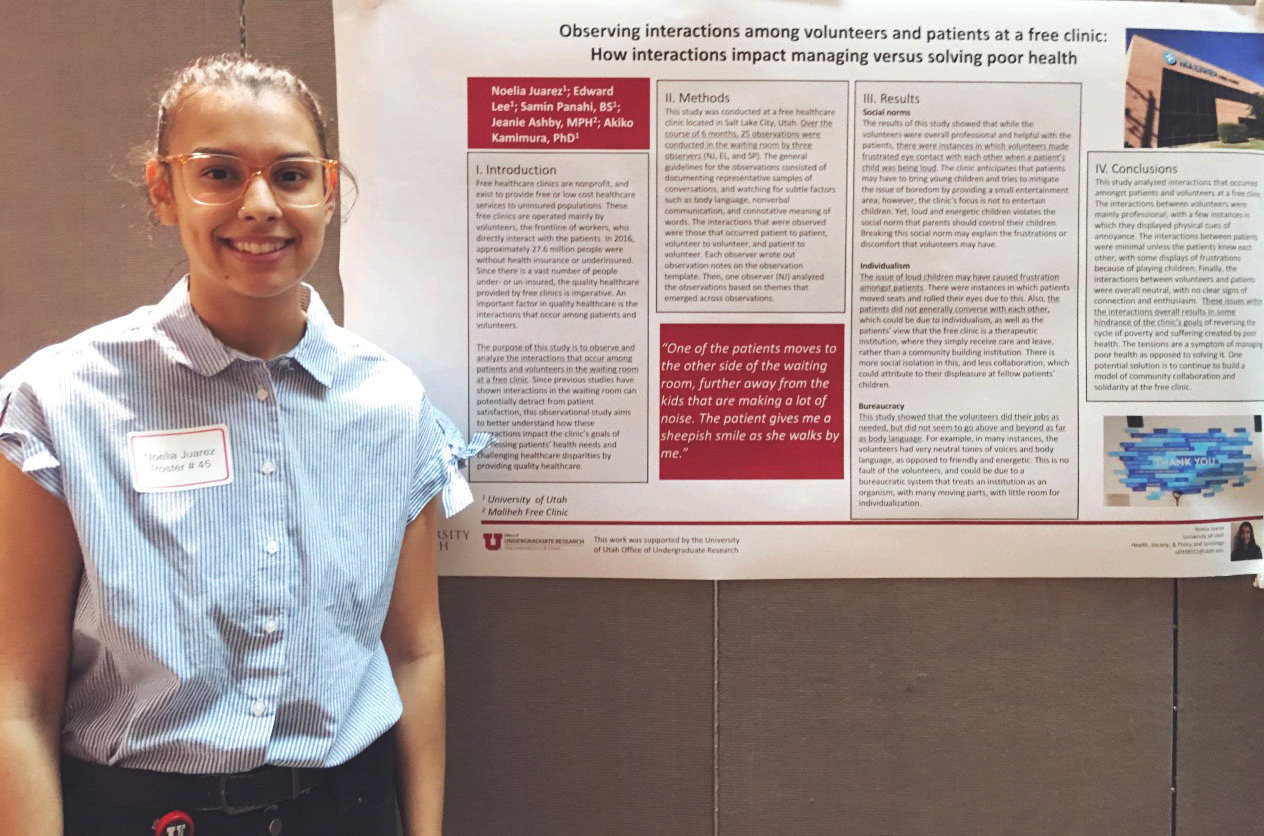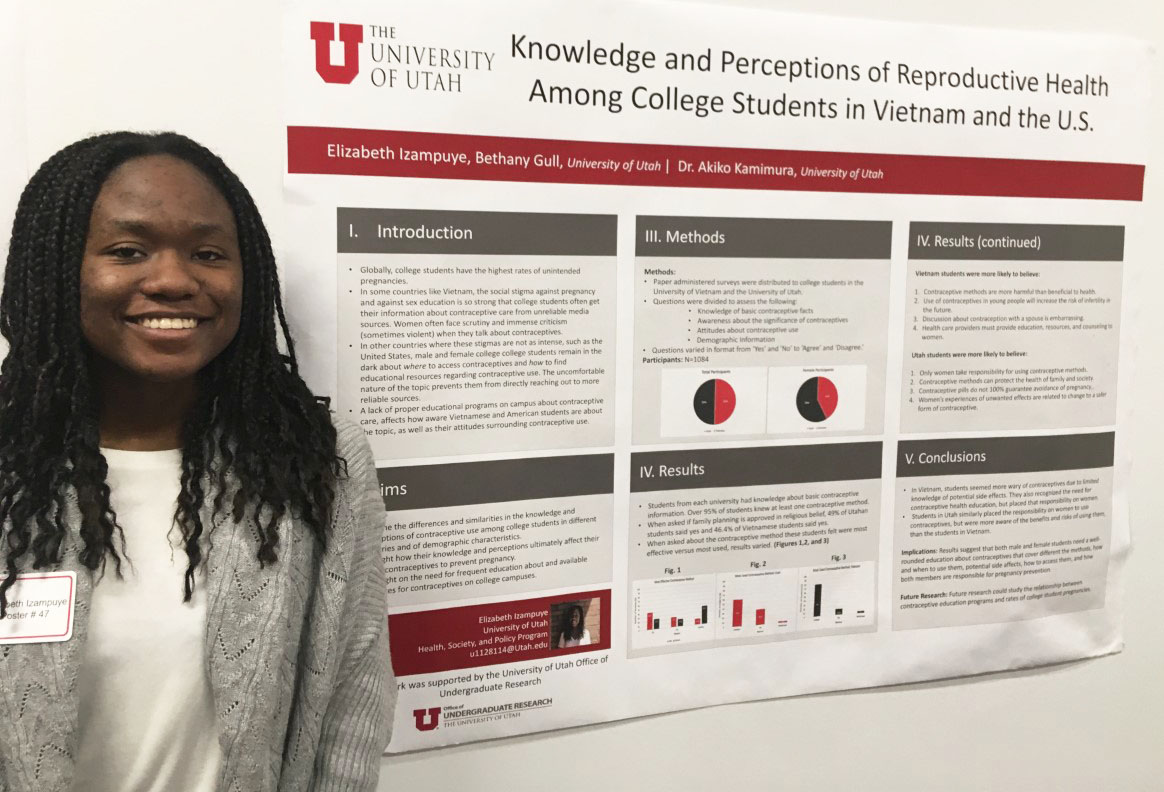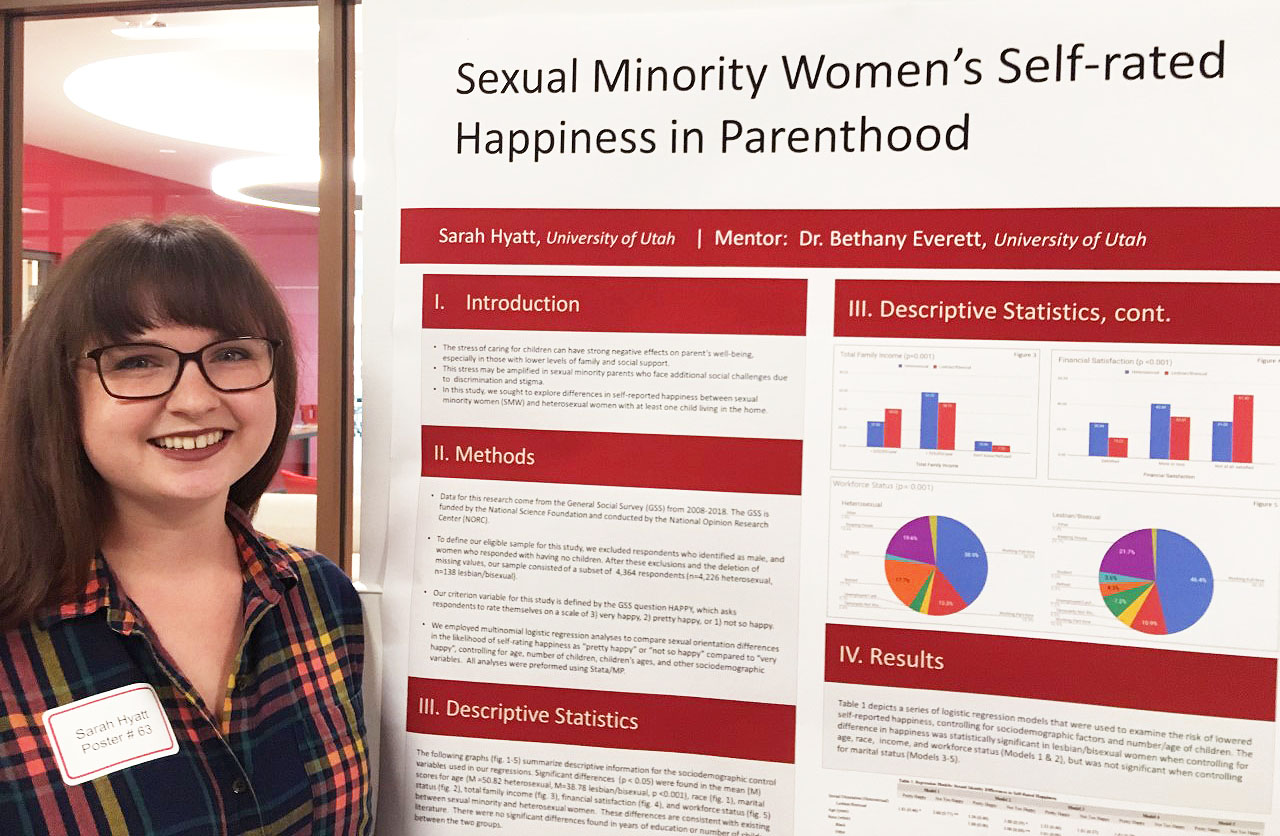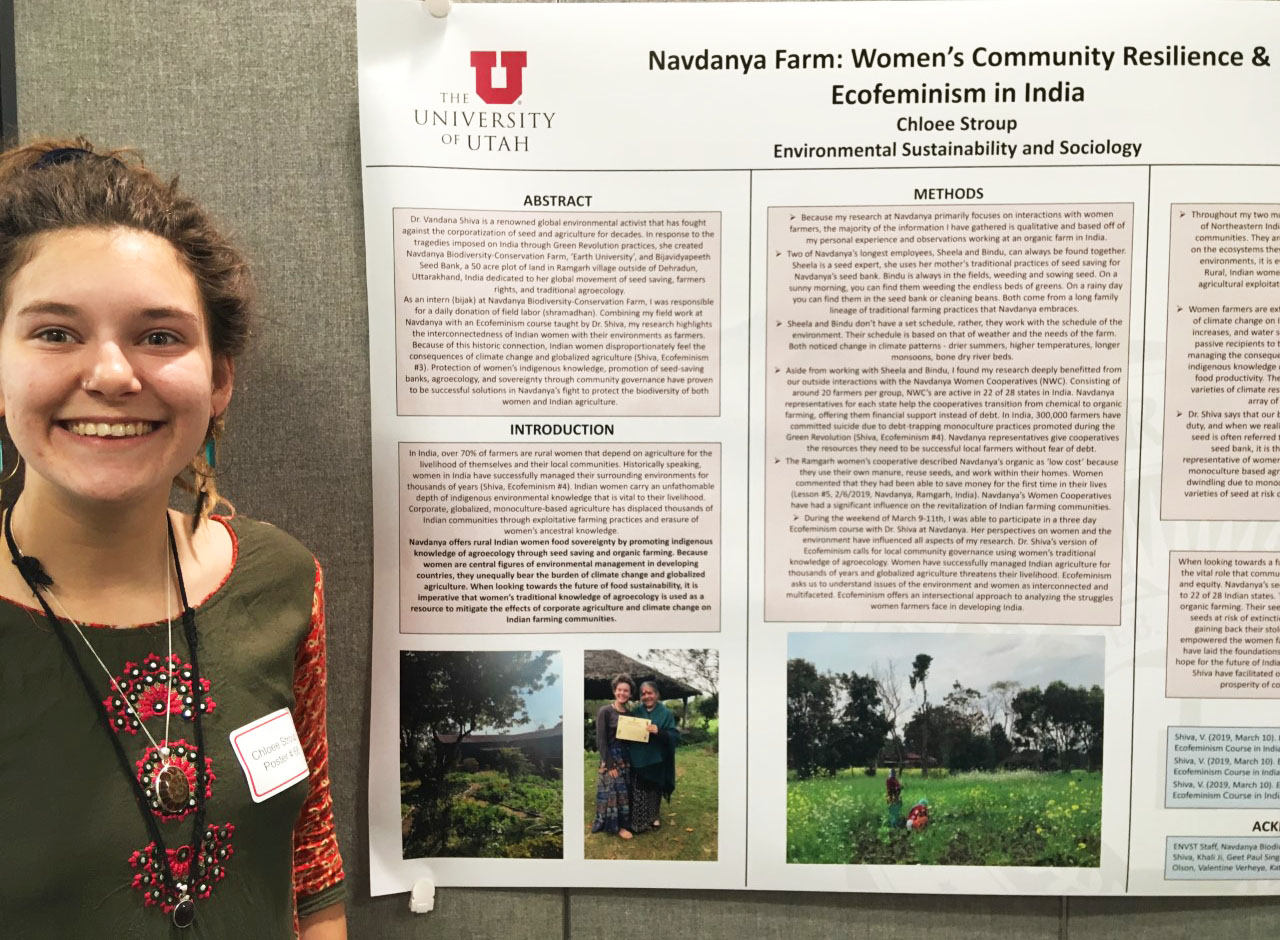Sociology STudents turn passions into solutions at csbs student Research Day
Sociology offers a number of ways students can hone their research skills and test hypotheses rooted in the body of knowledge about society that they gain through courses taken in the Sociology Department.
On April 16, 2019, the College of Social and Behavioral Sciences hosts Undergraduate Student Research Day, held annually, gives both graduate and undergraduate students in the College the opportunity to showcase original research projects using poster presentations. A panel of faculty judges evaluate the projects.
What Research Questions are Students Asking?
The studies students selected reflect their own questions and interests and gain the tools to more fully investigate their concerns whether they have to do with social experiences of low-income patients at a local free clinic; cross-national attitudes about contraception in the United States and Vietnam; parenting experiences within the LGBTQ community; or tests of women's empowerment on a sustainable farm in India.
I started wondering, how welcoming are free clinics to their patients? Does care begin as soon as patients come through the door?
-Noelia Juarez
Observing interactions among volunteers and patients at a free clinic: How interactions impact managing versus solving poor health
 Noelia Juarez became interested in her subject during the course of taking a class
with sociology Assistant Professor of Sociology, Akiko Kamimura called “Social Disparities
in Health.” Juarez studied alongside students who had opted for the “community engaged
learning” version of the course which included research excursions to the Maliheh
Free Clinic in Millcreek, Utah. The reports given by students engaging in community
research inspired Noelia to devise her own research questions and to enroll in a Senior
Thesis project in sociology mentored by Prof. Kamimura. Noelia was interested in
the social interactions within the clinic and whether the social environment of the
clinic reflects or challenges attitudes about health care access within the broader
society. To answer her question, she observed interactions between volunteer staff
and patients as well as interactions among patients. Noelia is interested in underlying
causes of poor health among low income residents without health insurance.
Noelia Juarez became interested in her subject during the course of taking a class
with sociology Assistant Professor of Sociology, Akiko Kamimura called “Social Disparities
in Health.” Juarez studied alongside students who had opted for the “community engaged
learning” version of the course which included research excursions to the Maliheh
Free Clinic in Millcreek, Utah. The reports given by students engaging in community
research inspired Noelia to devise her own research questions and to enroll in a Senior
Thesis project in sociology mentored by Prof. Kamimura. Noelia was interested in
the social interactions within the clinic and whether the social environment of the
clinic reflects or challenges attitudes about health care access within the broader
society. To answer her question, she observed interactions between volunteer staff
and patients as well as interactions among patients. Noelia is interested in underlying
causes of poor health among low income residents without health insurance.
Knowledge and Perceptions of Reproductive Health Among College Students in Vietnam and the U.S.
Elizabeth Izampuye and Bethany Gull, sociology graduate student
 Elizabeth Izampuye together with sociology graduate student, Bethany Gull designed
a special project as part of a Sociology Research Methods course taken with Assistant
Professor of Sociology, Akiko Kamimura. Izampuye examined surveys administered to
college students in the U.S. and in Vietnam to compare knowledge and perceptions around
reproductive health services.
Elizabeth Izampuye together with sociology graduate student, Bethany Gull designed
a special project as part of a Sociology Research Methods course taken with Assistant
Professor of Sociology, Akiko Kamimura. Izampuye examined surveys administered to
college students in the U.S. and in Vietnam to compare knowledge and perceptions around
reproductive health services.
“In some countries, like Vietnam, the social stigma against pregnancy and against sex education is so strong that college students often get their information about contraceptive care from unreliable media sources. Women often face scrutiny and immense criticism (sometimes violent) when they talk about contraceptives," Izampuye said.
The study suggests that even in other countries where these stigmas are not as intense, such as the United States, male and female college students, nevertheless, remain largely in the dark about where to access contraceptive use. The uncomfortable nature of the topics prevents them from directly reaching out to more reliable sources.
Izampuye noted that the study seems to indicate that "a lack of proper educational programs on campus about contraceptive care really affects how aware Vietnamese and American students are about the topic, as well as their attitudes about contraceptive use such as whose responsibility it is to ensure std and unwanted pregnancy prevention.”
Sexual Minority Women's Self-rated Happiness in Parenthood
 Sarah Hyatt, Bethany Everett “Sexual Minority Women’s Self-Rated Happiness in Parenthood”
Sarah Hyatt, Bethany Everett “Sexual Minority Women’s Self-Rated Happiness in Parenthood”
As a special project stemming from a course called Gender, Sexuality, and Health with Sociology Assistant Professor of Bethany Everett, Sarah Hyatt became interested in to what degree sexual minority women experienced discrimination and to what degree this affected their experiences of parenting. After controlling for other difficulty factors such as race and socio-economic status, Sarah found that there was still an impact on parental satisfaction for sexual minority women; however, whether the respondent was a single parent or had a co-parent had a deeper impact on parental satisfaction rating than the sexuality of the parent.
Navdanya Farm: Women’s Community Resilience & Ecofeminism in India
 Chloee Stroup, double majoring in Environmental Sustainability and Sociology, engaged
in an experiential research project incorporating themes from both sociology and environmental
studies. Chloee wrote a qualitative narrative about her experience participating
in an internship on a working research farm in India that was part of an organization
lead by Vandana Shiva, an Indian scholar, environmental activist, food sovereignty
advocate, environmental activist and after globalization author. Part of Chloee’s
internship required that she share the labor of the farm work with two women who were
equipped with traditional Indian farming methods such as seed saving. Traditional
methods, considered to be more sustainable than industrial agriculture methods, were
continually tested as climate conditions fluctuate under climate change conditions
stemming from fossil fuels. Chloee paid particular attention to both the environmental
and sustainability oriented methods of Shiva and the farm workers as well as the social
capital farm workers had with regard to their autonomy in decision-making in relation
to Dr. Shiva. Chloee’s observation was that the farm offered an important research
and empowerment opportunity for the women farm workers.
Chloee Stroup, double majoring in Environmental Sustainability and Sociology, engaged
in an experiential research project incorporating themes from both sociology and environmental
studies. Chloee wrote a qualitative narrative about her experience participating
in an internship on a working research farm in India that was part of an organization
lead by Vandana Shiva, an Indian scholar, environmental activist, food sovereignty
advocate, environmental activist and after globalization author. Part of Chloee’s
internship required that she share the labor of the farm work with two women who were
equipped with traditional Indian farming methods such as seed saving. Traditional
methods, considered to be more sustainable than industrial agriculture methods, were
continually tested as climate conditions fluctuate under climate change conditions
stemming from fossil fuels. Chloee paid particular attention to both the environmental
and sustainability oriented methods of Shiva and the farm workers as well as the social
capital farm workers had with regard to their autonomy in decision-making in relation
to Dr. Shiva. Chloee’s observation was that the farm offered an important research
and empowerment opportunity for the women farm workers.
Three cash prizes are awarded for the best posters in each of the graduate research and undergraduate research categories. The Student Choice Award is given out to the student whose poster receives the most votes during the main exhibition period.
There were 72 poster presentations. Seven of those were guided by Sociology faculty mentors or majors in Sociology. Presenters from the Department of Sociology included: Samin Panahi, Sociology graduate student; Callie Avondet, History and Sociology; Rebecca Higham, Sociology and Health, Society and Policy; Sarah Hyatt, Health, Society and Policy; Elizabeth Izampuye, Health, Society and Policy mentored by Sociology faculty member, Akiko Kamimura; Noelia Juarez, Sociology and Health, Society and Policy; Chloee Stroup, Sociology and Environmental Studies.
Sociology students competed with students from nine departments and programs within the College of Social and Behavioral Sciences.
Sociology graduate students were among the judges for the event: Bethany Gull, Scott Wood, and Kris Young.
Sociology Faculty judges included: Rebecca Utz and Kim Korinek.
